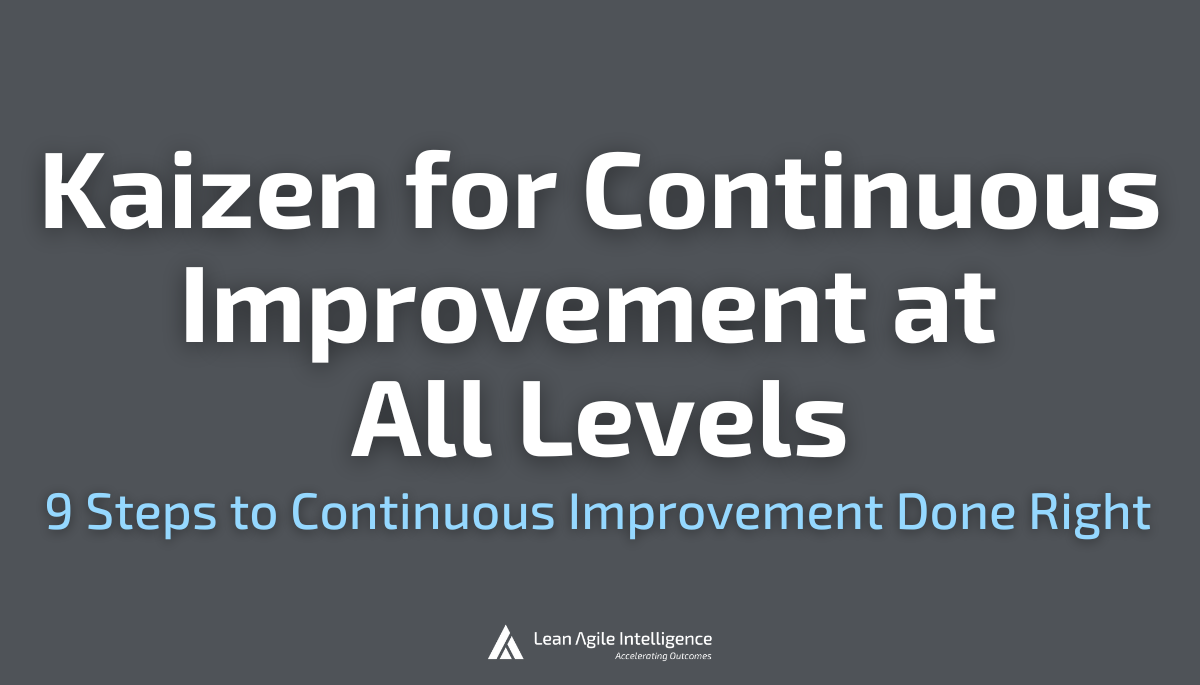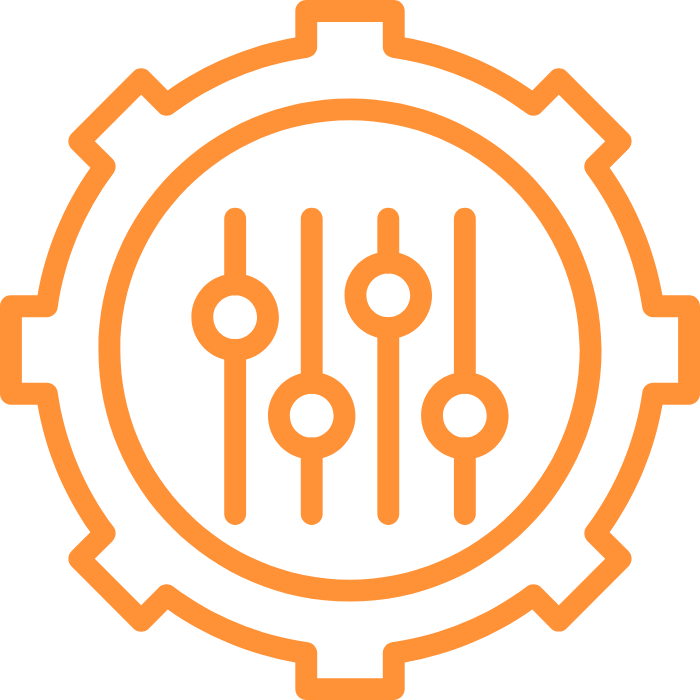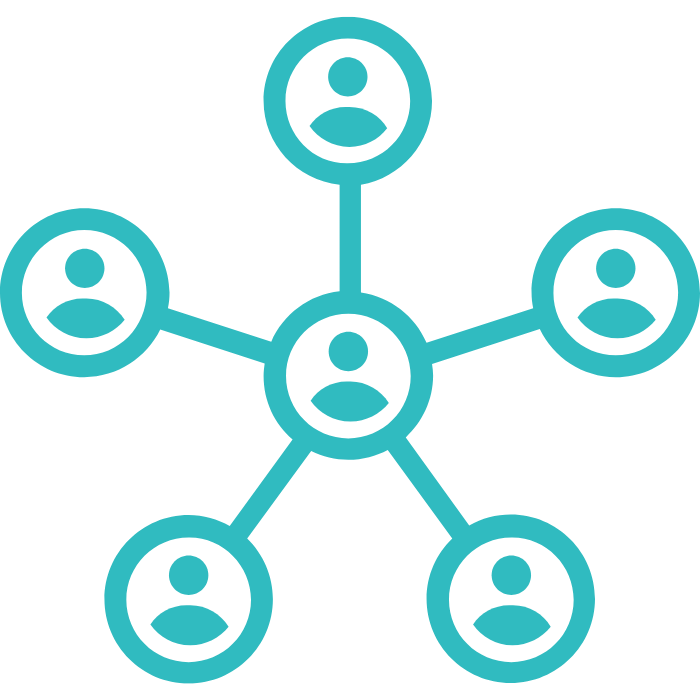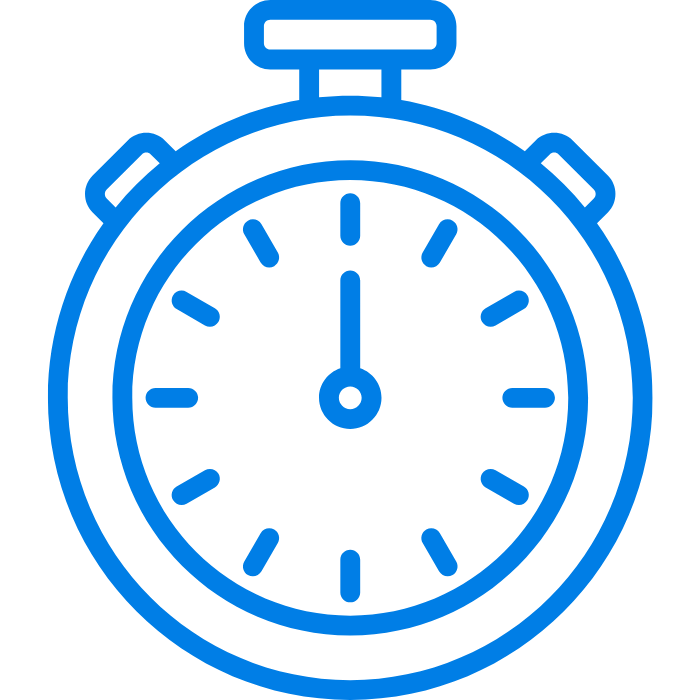Leverage the Power of Kaizen for Continuous Improvement at All Levels
By Team Lean Agile Intelligence

9 Steps to Continuous Improvement Done Right
What is Kaizen?
Many organizations striving for continuous improvement face common challenges:
- Processes bogged down by inefficiencies
- A lack of clear direction in implementing changes
- Difficulties in fostering a culture that embraces ongoing enhancement.
If these issues sound familiar, Kaizen might be the solution you need.
Kaizen is a Japanese philosophy that emphasizes small, incremental changes to achieve significant improvements. It's the foundation of all lean production methods, focusing on eliminating waste and boosting productivity.
Kaizen helps organizations sustain progress over time by fostering a culture of continuous improvement. Its tools and techniques empower teams to quickly identify and address inefficiencies.
.png?width=1117&height=1019&name=Community%20Home%20Page%20Images%20(7).png)
How Kaizen Enables Continuous Improvement at Scale
Before diving into the nine actionable steps to implement, it's important to understand how Kaizen enables you to scale continuous improvement efforts:
-
Structured Methodologies - Kaizen employs tools like Value Stream Mapping and Self-Assessments to support improvement efforts. These tools help identify inefficiencies, streamline processes, and ensure that improvements are systematically and sustainable.
-
Cultural Shift - Kaizen fosters a culture of continuous improvement by encouraging open communication, knowledge sharing, and employee empowerment. By involving employees at all levels in problem-solving, organizations create an environment where continuous improvement is ingrained, and people feel safe speaking up.
-
Data-Driven Decision Making - Kaizen emphasizes the importance of data in making informed decisions. Organizations can gather insights into goal progress, impediments, and business impacts by setting and monitoring key performance indicators (KPIs) and using robust intelligence platforms. This data-driven approach provides clarity when making decisions and ensures actions yield measurable results.
9 Actionable Steps to Implement Kaizen
#1 Start with Goals
Start with the why, and how it will contribute to the bigger picture. Continuous improvement activities often get postponed due to higher strategic priorities. Therefore, be laser-focused on aligning improvements with organizational goals, ensuring they are seen as enablers rather than obstacles.

#2 Measure
Measure Comprehensively: Any measurement strategy should be comprehensive and involve leading and leading and lagging indicators to monitor progress towards a goal and indicate whether it has been achieved.
-
Leading Indicators: ‘In-progress' measures that help us predict future outcomes such as team self-assessment scores.
-
Lagging Indicators are 'After-the-event' measures that indicate whether a goal was met like code deployment rates, and customer feedback scores.

#3 Involve Team Members
The people doing the work know best! Engage teams for feedback on potential improvements. For example, quarterly self-assessments help team members reflect on goals, discuss what’s working, and identify areas for improvement in a safe environment.

#4 Gather Insights - Identify Themes
- Be Thorough and Identify Content: Gather data from multiple channels to separate symptoms from root causes before acting.
- Organize and Visualize: Contextualize the data through simplified presentations to make it actionable. Use a framework and data model where information is organized and connected, with dashboards offering macro and micro-level views.
- Find Connections: Look for correlations between qualitative behavior trends (leading indicators) and performance metrics (lagging indicators) to inform decision-making.

#5 Act - Decide What to Do
- Alignment: Focus improvement efforts on organizational goals. If efforts aren't contributing to organizational goals, we need to ask ourselves if our efforts are truly strategically aligned.
- Connect: In team self-assessments, connect chosen practices and behaviors to these goals to gain necessary support.

#6 Run an Experiment
Prove the value of improvement efforts early and often. Treat proposed improvements as hypotheses and run experiments to test their impact. Teams should find opportunities to experiment and determine if the changes achieve the desired results.
#7 Regularly Measure and Analyze Results
- Drive Accountability: Hold everyone accountable and ensure the team follows through on their commitments.
- Gather Feedback: Collect feedback from participants to gauge the perceived value of the improvement.
- Track Trends: Track the completion of improvements and team feedback as leading indicators of future outcomes that indicate progress towards the goal
- Monitor Impact: performance metrics like productivity, quality output, error rates, and customer satisfaction to see the long-term impact, keeping in mind these are lagging indicators.

#8 Adopt or Adjust
If an improvement proves successful, operationalize it into the regular process. If not, try something new!
#9 Repeat The Process
Kaizen is an ongoing. Continuously focus on new outcomes or improve existing capabilities.
Get Started For Free
Why wait? Try Lean Agile Intelligence for free and explore how to scale your continuous improvement process. See the impact before you commit - contact us and book a meeting here.
Lean Agile Intelligence Makes This Easy
Cut Down On Time
Excel doesn't scale and your time is valuable. Our streamlined assessment process speeds up data collection for both quantitative and qualitative assessments, making the insights more meaningful. We present data in a way that makes sense for your organization, empowering you to make decisions with confidence.

Customizable
We understand that every organization is unique. That's why our customizable assessment templates allow you to tailor your measurement strategy to your specific goals. Empower your teams with targeted improvement strategies, making your efforts a true value-add.

Comprehensive Results Across All Levels
Gain actionable intelligence at every level with our intuitive dashboards and aggregate rollups. Whether you're a leader, coach, team, or individual, our tools help you identify and overcome obstacles to value delivery.
Ready To Talk Measurement Strategy?
Meet with our experts for free and talk strategy! Our Lean Agile Intelligence experts have been helping organizations grow for over a decade, and they would love to help you. Contact us now!
